英语三级语法考点归纳
公共英语三级语法知识汇总
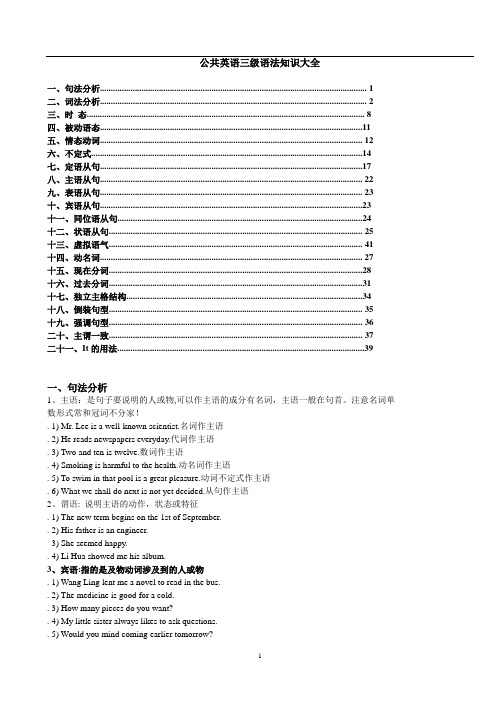
公共英语三级语法知识大全一、句法分析 (1)二、词法分析 (2)三、时态 (8)四、被动语态 (11)五、情态动词 (12)六、不定式 (14)七、定语从句 (17)八、主语从句 (22)九、表语从句 (23)十、宾语从句 (23)十一、同位语从句 (24)十二、状语从句 (25)十三、虚拟语气 (41)十四、动名词 (27)十五、现在分词 (28)十六、过去分词 (31)十七、独立主格结构 (34)十八、倒装句型 (35)十九、强调句型 (36)二十、主谓一致 (37)二十一、It的用法 (39)一、句法分析1、主语:是句子要说明的人或物,可以作主语的成分有名词,主语一般在句首。
注意名词单数形式常和冠词不分家!. 1) Mr. Lee is a well-known scientist.名词作主语. 2) He reads newspapers everyday.代词作主语. 3) Two and ten is twelve.数词作主语. 4) Smoking is harmful to the health.动名词作主语. 5) To swim in that pool is a great pleasure.动词不定式作主语. 6) What we shall do next is not yet decided.从句作主语2、谓语: 说明主语的动作,状态或特征. 1) The new term begins on the 1st of September.. 2) His father is an engineer.3) She seemed happy.. 4) Li Hua showed me his album.3、宾语:指的是及物动词涉及到的人或物. 1) Wang Ling lent me a novel to read in the bus.. 2) The medicine is good for a cold.. 3) How many pieces do you want?. 4) My little sister always likes to ask questions.. 5) Would you mind coming earlier tomorrow?. 6) He asked me what I was going to do tonight4、宾语补足语:在宾语后面补充说明宾语的动作、状态、特征。
公共英语三级语法知识汇总

公共英语三级语法知识大全一、句法分析 (1)二、词法分析 (2)三、时态 (8)四、被动语态 (11)五、情态动词 (12)六、不定式 (14)七、定语从句 (17)八、主语从句 (22)九、表语从句 (23)十、宾语从句 (23)十一、同位语从句 (24)十二、状语从句 (25)十三、虚拟语气 (41)十四、动名词 (27)十五、现在分词 (28)十六、过去分词 (31)十七、独立主格结构 (34)十八、倒装句型 (35)十九、强调句型 (36)二十、主谓一致 (37)二十一、It的用法 (39)一、句法分析1、主语:是句子要说明的人或物,可以作主语的成分有名词,主语一般在句首。
注意名词单数形式常和冠词不分家!. 1) Mr. Lee is a well-known scientist.名词作主语. 2) He reads newspapers everyday.代词作主语. 3) Two and ten is twelve.数词作主语. 4) Smoking is harmful to the health.动名词作主语. 5) To swim in that pool is a great pleasure.动词不定式作主语. 6) What we shall do next is not yet decided.从句作主语2、谓语: 说明主语的动作,状态或特征. 1) The new term begins on the 1st of September.. 2) His father is an engineer.3) She seemed happy.. 4) Li Hua showed me his album.3、宾语:指的是及物动词涉及到的人或物. 1) Wang Ling lent me a novel to read in the bus.. 2) The medicine is good for a cold.. 3) How many pieces do you want?. 4) My little sister always likes to ask questions.. 5) Would you mind coming earlier tomorrow?. 6) He asked me what I was going to do tonight4、宾语补足语:在宾语后面补充说明宾语的动作、状态、特征。
全国公共英语三级常见语法
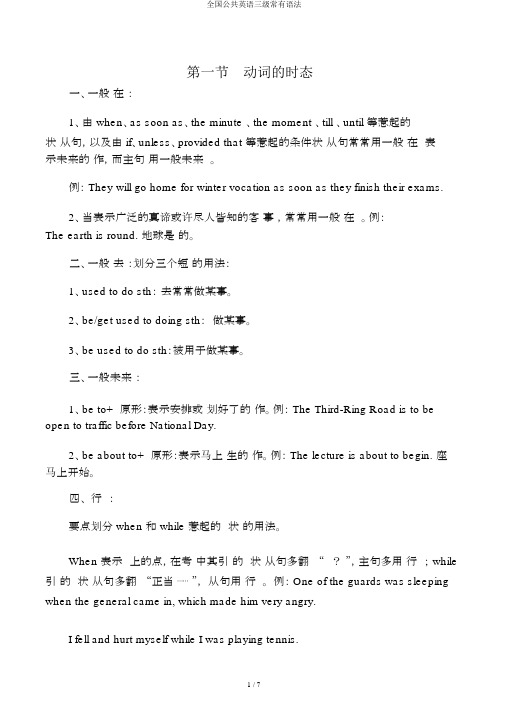
第一节动词的时态一、一般在:1、由 when、as soon as、the minute 、the moment 、till 、until 等惹起的状从句,以及由 if、unless、provided that 等惹起的条件状从句常常用一般在表示未来的作,而主句用一般未来。
例: They will go home for winter vocation as soon as they finish their exams.2、当表示广泛的真谛或许尽人皆知的客事,常常用一般在。
例:The earth is round. 地球是的。
二、一般去:划分三个短的用法:1、used to do sth:去常常做某事。
2、be/get used to doing sth:做某事。
3、be used to do sth:被用于做某事。
三、一般未来:1、be to+原形:表示安排或划好了的作。
例: The Third-Ring Road is to be open to traffic before National Day.2、be about to+原形:表示马上生的作。
例: The lecture is about to begin.座马上开始。
四、行:要点划分 when 和 while 惹起的状的用法。
When 表示上的点,在考中其引的状从句多翻“ ?”,主句多用行; while 引的状从句多翻“正当⋯⋯ ”,从句用行。
例: One of the guards was sleeping when the general came in, which made him very angry.I fell and hurt myself while I was playing tennis.五、此刻达成时:要点划分 have (has) been to:某人去过某地,表示一种经历,重申状态,能够和 once,twice ,often ,never,ever 连用;Have (has) gone to:某人在去某地的途中或已在某地,重申换作。
最新大学英语三级语法知识总结汇总
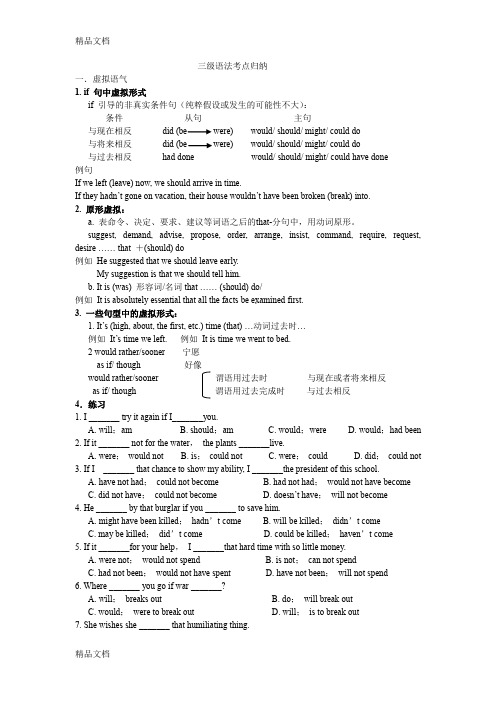
三级语法考点归纳一.虚拟语气1. if 句中虚拟形式if 引导的非真实条件句(纯粹假设或发生的可能性不大):条件从句主句与现在相反did (be were) would/ should/ might/ could do与将来相反did (be were) would/ should/ might/ could do与过去相反had done would/ should/ might/ could have done例句If we left (leave) now, we should arrive in time.If they hadn’t gone on vacation, their house wouldn’t have been broken (break) into.2. 原形虚拟:a. 表命令、决定、要求、建议等词语之后的that-分句中,用动词原形。
suggest, demand, advise, propose, order, arrange, insist, command, require, request, desire …… that +(should) do例如He suggested that we should leave early.My suggestion is that we should tell him.b. It is (was) 形容词/名词that …… (should) do/例如It is absolutely essential that all the facts be examined first.3. 一些句型中的虚拟形式:1. It’s (high, about, the first, etc.) time (that) …动词过去时…例如It’s time we left.例如It is time we went to bed.2 would rather/sooner 宁愿as if/ though 好像would rather/sooner 谓语用过去时与现在或者将来相反as if/ though 谓语用过去完成时与过去相反4.练习1. I _______ try it again if I_______you.A. will;amB. should;amC. would;wereD. would;had been2. If it _______ not for the water,the plants _______live.A. were;would notB. is;could notC. were;couldD. did;could not3. If I _______ that chance to show my ability, I _______the president of this school.A. have not had;could not becomeB. had not had;would not have becomeC. did not have;could not becomeD. doesn’t have;will not become4. He _______ by that burglar if you _______ to save him.A. might have been killed;hadn’t comeB. will be killed;didn’t comeC. may be killed;did’t comeD. could be killed;haven’t come5. If it _______for your help,I _______that hard time with so little money.A. were not;would not spendB. is not;can not spendC. had not been;would not have spentD. have not been;will not spend6. Where _______ you go if war _______?A. will;breaks outB. do;will break outC. would;were to break outD. will;is to break out7. She wishes she _______ that humiliating thing.A. doesn’t doB. didn’t doC. haven’t doneD. hadn’t done8. The chairman suggested that the meeting _______ put off.A. can beB. beC. isD. will be9. It is vital that he _______ immediately.A. should goB. must goC. goesD. went10. It is time we _______do our homework.A. begin toB. can begin toC. began toD. will begin to答案:1.选C。
大学英语三级考试语法复习要点总结
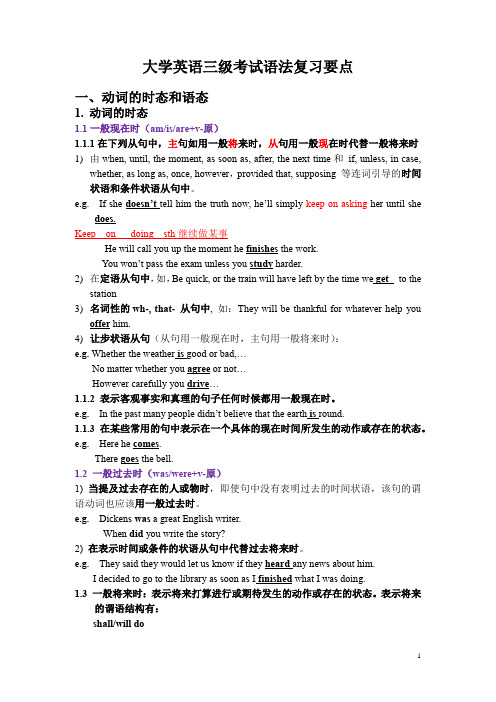
大学英语三级考试语法复习要点一、动词的时态和语态1. 动词的时态1.1一般现在时(am/is/are+v-原)1.1.1在下列从句中,主句如用一般将来时,从句用一般现在时代替一般将来时1)由when, until, the moment, as soon as, after, the next time和if, unless, in case,whether, as long as, once, however,provided that, supposing 等连词引导的时间状语和条件状语从句中。
e.g. If she doesn’t tell him the truth now, he’ll simply keep on asking her until shedoes.Keep on doing sth继续做某事He will call you up the moment he finishes the work.You won’t pass the exam unless you study harder.2)在定语从句中,如,Be quick, or the train will have left by the time we get to thestation3)名词性的wh-, that-从句中, 如:They will be thankful for whatever help youoffer him.4)让步状语从句(从句用一般现在时,主句用一般将来时):e.g. Whether the weather is good or bad,…No matter whether you agree or not…However carefully you drive…1.1.2 表示客观事实和真理的句子任何时候都用一般现在时。
e.g.In the past many people didn’t believe that the earth is round.1.1.3 在某些常用的句中表示在一个具体的现在时间所发生的动作或存在的状态。
英语三级语法点总结
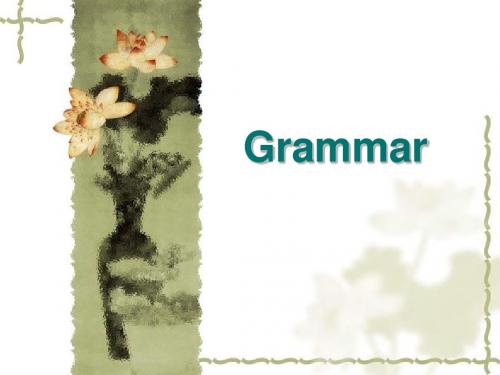
虚拟语气用于表语从句、同位语从句
在suggestion, advice, proposal, order, decision, plan,idea,desire等需要 有内涵的名词后面的表语从句、同位语从句 中,要使用虚拟语气。其谓语动词用动词原 形或should +动词原形。例如:
My suggestion is that we should go there at once. What do you think of his proposal that we should put on a play at the English evening? An order has come that no language but German should be taught in the local school.
在虚拟语气中,无论主句中动词是现在时还是过去 时,只要as if/though从句所指的时间与其同时, 都用过去式,若非同时而是较早,或表示已经持续 了若干时间,则用过去完成式。例如: He ordered me about as though I were his wife. I was so happy that I felt as if I had wings and could fly. He looked as if he hadn‟t had a decent meal for a month.
非真实条件句中谓语动词形式
条件从句 与现在事实相反 If sb.+过去式 (be的过去式是 were) 主句 sb.+ would (should, could, might)+动词原 形
与过去事实相反
三级公共英语语法重点

• would rather+从句,是一个常用的虚拟语 气句型 Would rather+从句,谓语一般用过去 时来表示现在或将来。其意为“宁愿……, 还是…… 好些”“一个人宁愿另一个人做 某事”。引导从句的that常省略。在谈到过 去的动作时,谓语则用过去完成时。
• John wants to see me today. I would rather he came to tomorrow than today. 约 翰今天想去看我。我宁愿他明天来看我而 不是今天。(句中came不是表示过去而是表 示将来)
• No sooner …than 刚一…就 • We had no sooner sat down than we found it was time to go. • No sooner had we sat down than we found it was time to go.
• Now that : since • Now that you are grown up, you must stop this childish behavior. • So… as 像…一样 否定句 • This room is not so large as that one. • So far as 就… • So far as I know, he will be away for three we名词+but also +名词 名词+but +名词
• Not only… + 名词+but also +名词作主语的 结构中,谓语动词与but also 后的名词的数 保持一致。 • Not only his wife but also his children have arrived.
2023年三级英语语法重点
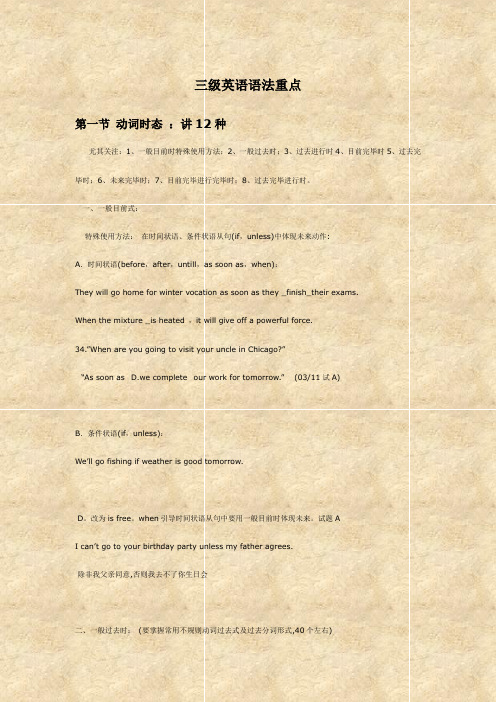
三级英语语法重点第一节动词时态:讲12种尤其关注:1、一般目前时特殊使用方法;2、一般过去时;3、过去进行时4、目前完毕时5、过去完毕时;6、未来完毕时;7、目前完毕进行完毕时;8、过去完毕进行时。
一、一般目前式:特殊使用方法:在时间状语、条件状语从句(if,unless)中体现未来动作:A.时间状语(before,after,untill,as soon as,when):They will go home for winter vocation as soon as they _finish_their exams.When the mixture _is heated ,it will give off a powerful force.34.”When are you going to visit your uncle in Chicago?”“As soon as D.we complete our work for tomorrow.” (03/11试A)B.条件状语(if,unless):We’ll go fishing if weather is good tomorrow.D。
改为is free。
when引导时间状语从句中要用一般目前时体现未来。
试题AI can’t go to your birthday party unless my father agrees.除非我父亲同意,否则我去不了你生日会二、一般过去时:(要掌握常用不规则动词过去式及过去分词形式,40个左右)1、简朴陈说去过动作或状态:would do2、used to do sth 过去常常做(目前不做了);be used to doing 习惯于做……(目前还在做)We used to swim in the river when we were in the countryside.咱们过去常在河里游泳。
(目前不了)The old man is used to getting up early in the morning. 老人习惯早起3、It is …time since +从句引导时间状语从句中,since后谓语动词用一般过去时(自从…以来)54. No one can possibly recall any detail about the meeting. It is at least five years since it C. took place . A卷三、一般未来时1、will(shall)+原形动词:体现未来动作或状态。
大学英语三级语法知识总结汇总
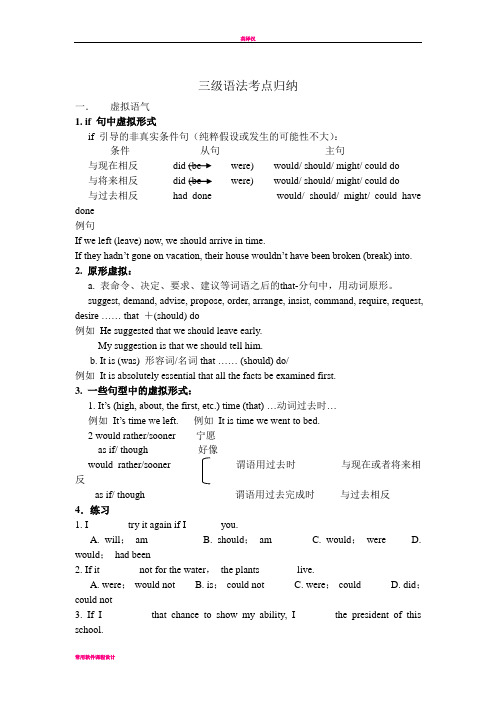
三级语法考点归纳一.虚拟语气1. if 句中虚拟形式if 引导的非真实条件句(纯粹假设或发生的可能性不大):条件从句主句与现在相反did (be were) would/ should/ might/ could do与将来相反did (be were) would/ should/ might/ could do与过去相反had done would/ should/ might/ could have done例句If we left (leave) now, we should arrive in time.If they hadn’t gone on vacation, their house wouldn’t have been broken (break) into.2. 原形虚拟:a. 表命令、决定、要求、建议等词语之后的that-分句中,用动词原形。
suggest, demand, advise, propose, order, arrange, insist, command, require, request, desire …… that +(should) do例如He suggested that we should leave early.My suggestion is that we should tell him.b. It is (was) 形容词/名词that …… (should) d o/例如It is absolutely essential that all the facts be examined first.3. 一些句型中的虚拟形式:1. It’s (high, about, the first, etc.) time (that) …动词过去时…例如It’s time we left.例如It is time we went to bed.2 would rather/sooner 宁愿as if/ though 好像would rather/sooner 谓语用过去时与现在或者将来相反as if/ though 谓语用过去完成时与过去相反4.练习1. I _______ try it again if I_______you.A. will;amB. should;amC. would;wereD. would;had been2. If it _______ not for the water,the plants _______live.A. were;would notB. is;could notC. were;couldD. did;could not3. If I _______ that chance to show my ability, I _______the president of this school.A. have not had;could not becomeB. had not had;would not have becomeC. did not have;could not becomeD. doesn’t have;will not become4. He _______ by that burglar if you _______ to save him.A. might have been killed;hadn’t comeB. will be killed;didn’t comeC. may be killed;did’t comeD. could be killed;haven’t come5. If it _______for your help,I _______that hard time with so little money.A. were not;would not spendB. is not;can not spendC. had not been;would not have spentD. have not been;will not spend6. Where _______ you go if war _______?A. will;breaks outB. do;will break outC. would;were to break outD. will;is to break out7. She wishes she _______ that humiliating thing.A. doesn’t doB. didn’t doC. haven’t doneD. hadn’t done8. The chairman suggested that the meeting _______ put off.A. can beB. beC. isD. will be9. It is vital that he _______ immediately.A. should goB. must goC. goesD. went10. It is time we _______do our homework.A. begin toB. can begin toC. began toD. will begin to答案:1.选C。
公共英语三级语法大总结

英语语法大总结第一部分第1章词类s,如下:一)一般在词后加s。
如:comes, spells, waits, talks, sees, dances, trains二)在x, sh, ch, s, tch后加es。
如:watches, washes, wishes, finishes三)1)以辅音字母加y结尾的变y为i再加es。
如:study-studies, hurry-hurries, try-tries2)以元音字母加y结尾的直接加s。
如:plays, says, stays, enjoys, buys四)以o结尾加es。
如:does, goes五)特殊的有:are-is, have-has一)在以x, sh, ch, s, tch结尾的名词后加es。
如:boxes, glasses, dresses, watches, wishes, faxes 读音变化:统一加读[iz]。
二)1)以辅音字母加y结尾的变y为i再加es 如:baby-babies, family-families,documentary-documentaries, 2)以元音字母加y结尾的直接加s。
如:day-days, boy-boys, toy-toys, key-keys, ways读音变化:加读[z]。
三)1)有些以o结尾的外来词或缩略词的复数形式只加“s”。
如:radios, photos,2)以辅音字母加o结尾的加es:如: tomatoes西红柿, potatoes马铃薯3)以元音字母加o结尾的单词只加“s”。
(radio,cameo,)教你一招☆如果以O结尾的名词有生命力,则该词汇一般加-es。
hero,tomato,potato,Negro(黑人)[简记:黑人英雄吃西红柿马铃薯。
]读音变化:加读[z]。
四)以f或fe结尾的把f, fe 去掉后+ves。
如:knife-knives, wife-wives, half-halves, leaf-leaves, yourself-yourselves 口诀。
英语三级语法汇总
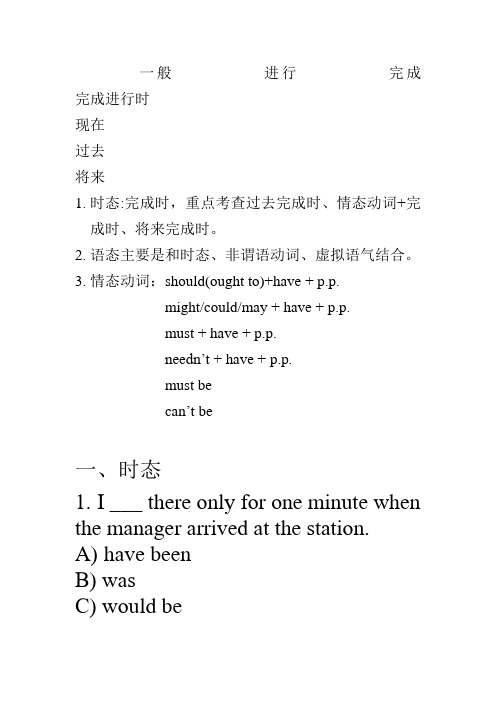
一般进行完成完成进行时现在过去将来1.时态:完成时,重点考查过去完成时、情态动词+完成时、将来完成时。
2.语态主要是和时态、非谓语动词、虚拟语气结合。
3.情态动词:should(ought to)+have + p.p.might/could/may + have + p.p.must + have + p.p.needn’t + have + p.p.must becan’t be一、时态1.I ___ there only for one minute when the manager arrived at the station.A)have beenB) wasC) would beD) had been2.By the time I got to the cinema, all the tickets for “The Merchant of Venice”____ out.A)were soldB)B) was soldC) had been soldD) have been sold3. When she arrived, I felt very bored and disappointed, because I _____ since seven o’clock.A. had waitedB) had been waitingC) were waitingD) have been waited4. My wallet is nowhere to be found. I ___when I was on the bus.A. must have dropped itB. must drop itC. should have dropped itD. have dropped it5. Just as I was leaving the house , it occurred to me that I ____to take my keys . (200406-30)A. should have forgottenB . have forgottenC. had forgottenD. must have forgotten6. They bought their first house last year , previously they _____to get a loan. (200306-21)A. were ableB. weren’t ableC. had been ableD. hadn‘t been able7. By the time we arrive in London, we___in Europe for two weeks. (200406-19)A. shall stayB. have stayedC. will have stayedD. have been staying8. Marie is very wet. She ______ in the river.A. can have fallenB. had to fallC. must have fallenD. needn’t to fall9. With all this work on hand, he ______ to the cinema last night.A. mustn’t goB. wouldn’t goC. ought to goD. shouldn’t have gone10. –Did you blame him for his carelessness?-Yes, but I _______ so.A.‘d rather not doB. shouldn’t doC. ‘d better not have doneD. shouldn’t have done11. “Did Ken take the job in the bookstore?”“No, but I think he ______.”A. will haveB. may haveC. should haveD. must have12. He _______ more than thirty.A. mustn’t beB. shouldn’t beC. won’t beD. can’t be13. You’re right. I _______ of that.A. should thinkB. should have thoughtC. must have thoughtD. needn’t think14. As we can’t get there in time, they ______ about our safety.A. should be worryingB. can be worryingC. must be worryingD. need be worrying15. I have already know about you; you ______ yourself to me.A. shouldn’t have introducedB. needn’t have introducedC. wouldn’t introduceD. mustn’t introduce16. Since my wife isn’t answering her telephone, she ________.A. must have leftB. should have leftC. can have leftD. need have left17. Since the ditch is full of water, it______ hard last night.A. ought to rainB. must have rainedC. might have rainedD. could rain18. Next month they_____ in the United States for thirty years.A. areB. have beenC. will beD. will have been19. It _______ for a week and the street were floodedA. has rainedB. had been rainingC. was rainingD. rained20. He was caught in a traffic jam and by the time he reached the airport his friend’s plane______.A. has already taken offB. had already taken offC. has been taken offD. had been taken off21. They told us that they _______ for more than two hours.A. have waitedB. were waitingC. have been waitingD. had been waiting22. It’s been a long time since I_______. How are you?A. had last seen youB. saw you lastC. have last seen youD. last was seeing you23. You needn’t hurry her. She ______ it by the time you are ready.A. will have been finishingB. will finishC. will have finishedD. will be finishing25. -“I have our tickets.”-“That’s good. I was afraid that you ______ them.”A. had forgottenB. forgotC. have forgottenD. are forgetting26. She said that she ______ soon.A. will go to collegeB. went to collegeC. would go to collegeD. won’t to go to college27. Last night he went to bed early. When we got there, he ______ to bed already.A. wentB. has goneC. had goneD. go二、非谓语动词(动名词、不定时、现在分词、过去分词<只有一种形式>)(doing/ to do/ doing/ done)(一般时、进行时、完成时)(主动、被动)1.英语中有些动词后面只能跟动名词作它的宾语。
公共英语三级语法大总结
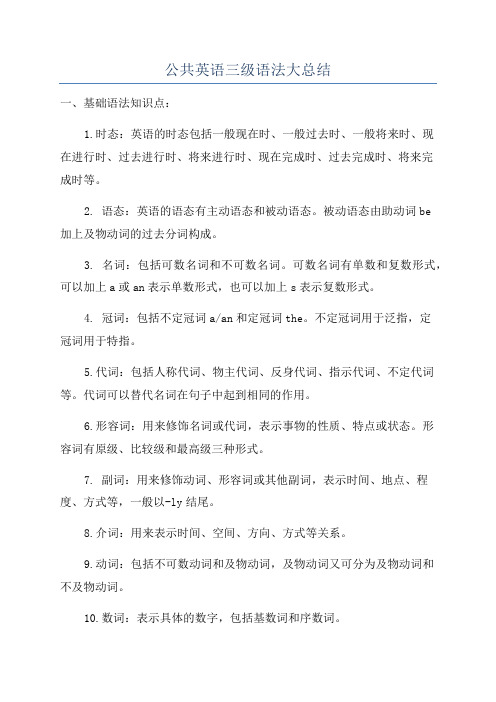
公共英语三级语法大总结一、基础语法知识点:1.时态:英语的时态包括一般现在时、一般过去时、一般将来时、现在进行时、过去进行时、将来进行时、现在完成时、过去完成时、将来完成时等。
2. 语态:英语的语态有主动语态和被动语态。
被动语态由助动词be加上及物动词的过去分词构成。
3. 名词:包括可数名词和不可数名词。
可数名词有单数和复数形式,可以加上a或an表示单数形式,也可以加上s表示复数形式。
4. 冠词:包括不定冠词a/an和定冠词the。
不定冠词用于泛指,定冠词用于特指。
5.代词:包括人称代词、物主代词、反身代词、指示代词、不定代词等。
代词可以替代名词在句子中起到相同的作用。
6.形容词:用来修饰名词或代词,表示事物的性质、特点或状态。
形容词有原级、比较级和最高级三种形式。
7. 副词:用来修饰动词、形容词或其他副词,表示时间、地点、程度、方式等,一般以-ly结尾。
8.介词:用来表示时间、空间、方向、方式等关系。
9.动词:包括不可数动词和及物动词,及物动词又可分为及物动词和不及物动词。
10.数词:表示具体的数字,包括基数词和序数词。
11.简单句:由主语和谓语构成,可以包含宾语、表语、宾语补足语等。
12.并列句:由两个或多个简单句用并列连词连接而成,表示并列关系。
13.复合句:包括主从复合句和连接复合句。
主从复合句由一个主句和一个或多个从句构成,连接复合句由两个或多个从句构成。
14.修饰语从句:修饰一个名词或代词的从句,通常由关系代词或关系副词引导。
15.定语从句:修饰一个名词或代词的从句,通常由关系代词或关系副词引导。
16.状语从句:修饰动词、形容词或副词的从句,通常由连词或连词短语引导。
17.祈使句:表示请求、命令、建议等,一般不指明主语,用动词原形开头。
18.感叹句:表示惊讶、高兴、忧虑等感叹的句子。
19.反意疑问句:用来表示征求对方的同意或确认,一般由一个陈述句和相应的疑问句组成。
二、高级语法结构:1.过去完成时:表示在过去一些时间点之前已经完成的动作或事件。
Catti英语三级语法点
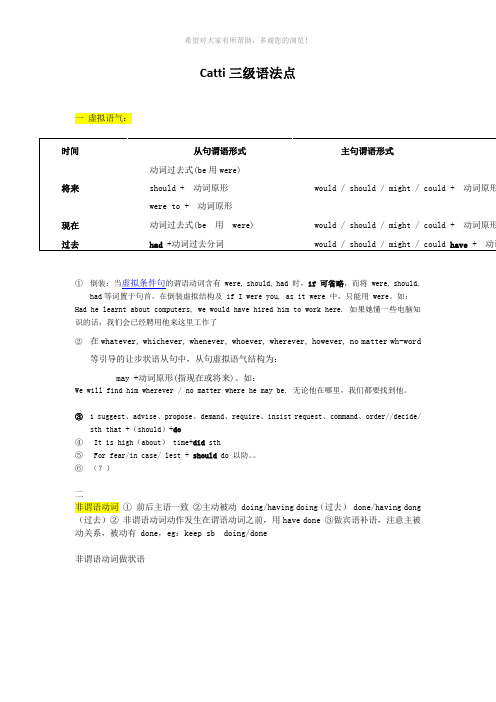
Catti三级语法点一虚拟语气:①倒装:当虚拟条件句的谓语动词含有 were, should, had 时,if 可省略,而将 were, should,had等词置于句首。
在倒装虚拟结构及 if I were you, as it were 中,只能用 were。
如:Had he learnt about computers, we would have hired him to work here. 如果她懂一些电脑知识的话,我们会已经聘用他来这里工作了②在whatever, whichever, whenever, whoever, wherever, however, no matter wh-word等引导的让步状语从句中,从句虚拟语气结构为:may +动词原形(指现在或将来)。
如:We will find him wherever / no matter where he may be. 无论他在哪里,我们都要找到他。
③ 1 s uggest、advise、propose、demand、require、insist request、command、order//decide/sth that +(should)+do④ It is high(about) time+did sth⑤ For fear/in case/ lest + should do 以防。
⑥(?)二非谓语动词①前后主语一致②主动被动 doing/having doing(过去) done/having dong (过去)②非谓语动词动作发生在谓语动词之前,用have done ③做宾语补语,注意主被动关系,被动有 done,eg:keep sb doing/done非谓语动词做状语(☆有些过去分词或短语来源于系表结构,或某些动词后面加-ed转化来的形容词,作状语时不表被动而表主语的状态。
常见的有lost(如例句6), seated, hidden, lost in, dressed in, faced with, absorbed in, surprised, disappointed, exhausted, frightened, satisfied(如例句7), tiredEg 6. She sat by the window alone, lost in thought.7. Satisfied with what he did, the teacher praised him in class.三反义疑问句1) 陈述部分的主语是I,疑问部分要用 aren't I.I'm as tall as your sister,aren't I?3) 陈述部分用 no, nothing, nobody, never, few, seldom, hardly, rarely, little等否定含义的词时,疑问部分用肯定含义。
- 1、下载文档前请自行甄别文档内容的完整性,平台不提供额外的编辑、内容补充、找答案等附加服务。
- 2、"仅部分预览"的文档,不可在线预览部分如存在完整性等问题,可反馈申请退款(可完整预览的文档不适用该条件!)。
- 3、如文档侵犯您的权益,请联系客服反馈,我们会尽快为您处理(人工客服工作时间:9:00-18:30)。
部分倒装 ①否定副词never, seldom, rarely, little, hardly, scarcely等位于句首 如:Never have I read such an interesting book. ②“only+状语”位于句首 如:Only in this way did I finish the homework. ③so/such…that引导的结果状语从句时,so/such置于句首 如:So frightened was he that he didn’t even want to move a pace. ④as/ though引导让步状语从句 如:Child as he is, he knows a lot. ⑤if引导的虚拟条件句中,若将if省略,were, had, should要提前 如:Should it rain tomorrow, we would stay at home. ⑥so / neither / nor表示“前面所说的情况也适合于后者时” 如:I came back late and so did my mother. ⑦当not until…位于句首时,其后的主句要用倒装语序 如:Not until the rain stopped did he leave the room.
Now that the room didn’t live up to the promises you makd in the advertisement, I want to ask for compensation. (2011.06 T20)
should/could/would/might do
If I were you, I would go on foot.
与将 来事 实相 反
从句:①If+主语+should do ②If+主语+did ③If+主语 +were to 主句:
should/could/would/might do
If it were to rain tomorrow, we would stay at home. If it should rain tomorrow, we would stay at home.
同 位 语 从 从句充当同位语(对前面抽象名词进行解释说明)
句
成分,
如:The fact that I won the game is true.
(the fact= I won the game)
She asked the reason why there was a delay.
同位语从句和定语从句的区别:
注: 引导限制性定语从句时,关系代词which可以与that 互换;但引导非限制性定语从句时,只能用which。
非限制性定语从句
(2016.12, T29) (2015.12, T26) (2014.12, T28) (2014.06, T24) (2013.12, T18)
6.名词性从句
(2017.06, T21) 表语从句 (2017.06, T22) 同位语从句 (2015.12, T30) 主语从句 (2014.12, T30) 宾语从句
We will inform you of the result as soon as the program is approved by the board.(2016年6月28题)
9.目的状语从句
常用引导词:so that, in order that(为了,以便)
The bank clerk listened carefully so that he could discover exactly what the client wanted.(2014年6月22 题)
7.状语从句
2017年6月27题:让步状语从句 2016年12月27题:让步状语从句 2016年6月28题:as soon as 引导的时间状语
从句 2014年6月22题: 目的状语从句 2011年6月20题:原因状语从句
8.时间状语从句
常用引导词:when(在…时), as (当…时), while(在…期间), as soon as(一……就……), before (在…之前), after(在...之后), since(自从...以来) , not...until (直到…才)until/till(直到…时)等
关系代词:who (人/主语);whom(人/宾语); whose (人/所有格);which(物);that(人/物) 3人1物1或人或物
关系副词:when 表时间;where表点;why表原因
定语从句分析3步骤: ①确定先行词(被修饰的名词); ②看从句是否完整,从句完整用关系副词,从句 不完整用关系代词; ③根据先行词和句子完整性确定关系词。
3. 虚拟语气
(2017.06, T23)与现在事实相反的假设 (2016.12, T25)与过去事实相反的假设 (2015.12, T25)与过去事实相反的假设 (2014.06, T25)与现在事实相反的假设 (2013.12, T16)与过去事实相反的假设
if虚拟条件句形式来自例句与过 去事 实相 反
定语从句
(2016.06, T23, T30) (2015.06, T24) (2014.06, T24)
限制性定语从句:从句对主句先行词加以限制和分类, 去掉它主句意思往往不明确,主句和从句之间不能用逗 号分开。 非限制性定语从句:从句起补充说明作用,在句子中不 充当成分,缺少也不会影响全句的理解,它与主句往往 用逗号隔开。
(2014.12 T25) keep on doing sth “继续做某事” (2014.12 T27) in one’s opinion “在某人看来,某人认为”(2014.06 T20) keep… under control “控制,监视…” (2013.12 T19) enjoy doing sth “乐于做某事,喜欢做某事”(2013.06 ) on business “出差,因公外出” (2012.12 T21) expect sb to do sth “期望某人做某事” (2012.12 T23) have difficulty (in) doing sth “在做…方面有困难” (2012.12
T24)
2. 倒装结构
①“only+状语”位于句首(2015.12 T24) 如:Only in this way did I finish the homework.
②当not until…位于句首或者no sooner… than中no sooner… 位于句首时,位于句首时,其后的主句要用倒装语序 (2015.06 T25)(2013.12 T25)(2012.12 T19) 如:Not until the rain stopped did he leave the room.
三级考试 常考语言点
1.常考固定搭配
too… to… “太…而不能…” (2017.06) help sb (to) do sth“帮助某人做某事”(2016.12 T21) so…that… “如此…以至于” (2016.12 T24) (2013.06 T16) be likely to do sth “有可能做某事” (2016.12 T30) either…or… “不是…就是…” (2016.06 T22) (2017.06) schedule to do sth “计划/安排做某事” (2016.06 T25) finish doing sth “完成做某事” (2016.06 T27) have sth doing “叫 / 让 / 使某人做某事或让某种情况发生”; have sth done完成做某事 (2016.06 T29) neither… nor… “既不…也不…” (2015.12 T27) have an impact/effect/ influence on “对…有影响” (2015.12
Is this the book that you were looking for? This is the man who helped me. The doctor whom you are looking for is in the room.
I have two sisters, who are both students. We were given a lovely double room, which had a sea view.
同位语从句:起补充说明的作用 They were delighted at the news that their team had won. The news that our team has won the game is really encouraging.
定语从句:修饰前面的名词 This is the news that makes them happy. The news that he told me is really encouraging.
4.强调句 (2015.06, T26) (2014.12, T22) (2013.06, T18) (2012.12, T25)
基本结构: It is/ was + 被强调部分+ that/ who … 强调主体是人,连词可使用that或者who; 强调主体是物,连词只能用that。
5. 定语从句:
主语从句
从句充当主语成分, 如:What I say is very important. That she was able to come made us very happy.
